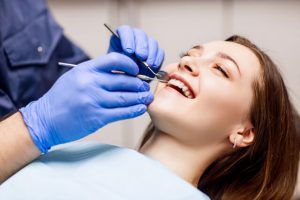Have you ever heard someone complaining about the pain they are experiencing because of a wisdom tooth? Well if you already heard, you might be afraid and wondering when do wisdom teeth grow. Actually, these teeth can develop naturally, and when that happens, you do not need to worry about the pain. If you are still concern about this, you can visit ADC’s dental clinic in Dubbo.
Wisdom teeth
Adult teeth are permanent teeth that replace baby teeth once they vanished. The mouth contains 32 adult teeth. These adult teeth consist of the following:
- Four central incisors
- Four lateral incisors
- Four cuspids also termed canine or eye teeth
- Four first bicuspids also called first premolars
- 4-second bicuspids also referred second premolars
- Four first molars also called 6-year molars
- 4-second molars also called 12-year molars
- Four third molars also called wisdom teeth
When do wisdom teeth grow? They usually develop between ages 17 to 21 and the last adult teeth on your mouth. Wisdom teeth can emerge at the top as well as the bottom.
The last set of adult teeth or wisdom teeth provides help to chew hard and rough food like nuts, roots, and leaves. They frequently emerge in crooked, sideways, or any case skewed. As they fill in, they can push on other teeth, causing issues of overcrowding and misalignment for them as well. When these problems happen, your dentist will recommend wisdom teeth removal.
Common Causes for Wisdom Teeth Removal
When your wisdom teeth grow properly, you may not be aware since there is no discomfort in your mouth. However, some problems do not show any indications. When do wisdom teeth grow if they develop properly, you can take note the following symptoms from different causes.
Impacted Wisdom Teeth
When you do not have enough space on your gums, impacted wisdom teeth happen. It is a disorder where the wisdom teeth prevents from developing normally.
Impacted wisdom teeth can cause indications, including:
- Jaw pain
- Swollen
- Bleeding Gums
- Bad Breath
- Stiffness in the Jaw
- Trouble opening your mouth
Sometimes, impacted wisdom teeth may not show any indications. Your dentists and oral surgeons may suggest wisdom teeth removal in this condition to prevent future problems.
Incorrect Growth
At times when wisdom teeth emerge, they occupy too much space in the mouth. It is not possible to fix these teeth with braces. At the point when the mouth is overcrowded, there is no practice that can be possible to make the teeth all fit together. The main alternative is to undergo wisdom teeth removal. Your dentist can identify which teeth may need to be eliminated. They may need to remove every one of them or a couple.
Pain and Irritation
When wisdom teeth emerge, they can result in a throbbing painfulness. In case you are encountering torment or discomfort, visit your dentist for an exam and x-ray. They can identify whether the actual wisdom teeth or different factors are causing pain. Mostly, your dentist will not decide that tooth removal is the best arrangement. After some time, your problem may correct itself, and your dentist will not require extraction.
Difficulty Eating
In case you encounter pain while chewing, this might be a reason to remove your wisdom teeth. Food could be stalling out in the middle of the gums and the tops of the teeth. This case could create a lot of issues if you cannot get to the back of the mouth and wash well enough while brushing. Contact your dentist to know the best way to handle this problem. If it is not possible to settle this, tooth removal might be the only option.
A Cyst Forms Around the Tooth
A cyst happens when a sac near to the teeth gets loaded up filled with fluid. If you leave this condition untreated, it can demolish bones, roots and encompassing structures. It turns out to be excessively extreme; it can transform into a tumor and require extra medical procedure.
Teeth are Not Straight
Wisdom teeth can make the other teeth shift and move over when they fill in crooked. They may even harm other teeth. Wisdom teeth removal can keep other teeth from having any damage. There are numerous speculations of why wisdom teeth tend to develop out crooked and sideways. It has been said that our jaws are not huge enough to oblige a third molar which at that point knocks against the others, making it become sideways. Furthermore, it would help if you considered eliminating wisdom teeth before orthodontic treatment to permit more space for misalignments to move.
Sinus Issues
 The last set of adult teeth can cause a variety of sinus issues. These problems emerge when teeth fill in on the upper jaw. Once the teeth develop and roots create, they can push and rub against the sinuses squeezing them. Although this issue does not occur much of the time, wisdom teeth can sometimes lead to sinus pain, headaches, and congestions.
The last set of adult teeth can cause a variety of sinus issues. These problems emerge when teeth fill in on the upper jaw. Once the teeth develop and roots create, they can push and rub against the sinuses squeezing them. Although this issue does not occur much of the time, wisdom teeth can sometimes lead to sinus pain, headaches, and congestions.
Cavities
The situation of the wisdom teeth can have a significant effect on cleaning surfaces where microscopic organisms can hide. In case the gums get irritated, pockets can produce between the teeth and cause bacteria to develop. This condition will then advance the development of cavities leading to contamination.
Inflamed Gums
In some cases, when wisdom teeth begin growing out, it can make a flap of gum tissue that dwells close to the tooth. This gum tissue can corner little particles of food and microorganisms. Tissue around the teeth can turn out to be hard and kindled, making it difficult to clean. This condition is called pericoronitis; it can likewise happen around wisdom teeth that are still beneath your gums.
A few individuals live with their wisdom teeth for their whole lives. Your dentist will not recommend extracting any teeth because there is the opportunity of the teeth moving. In case they are not causing you any problems, you should not stress over having them taken out. If your dentist recommends pulling out your wisdom teeth, you may need to get all of them removed at the same time. However, your dentist may only recommend this option to keep you from having to make a subsequent arrangement.


